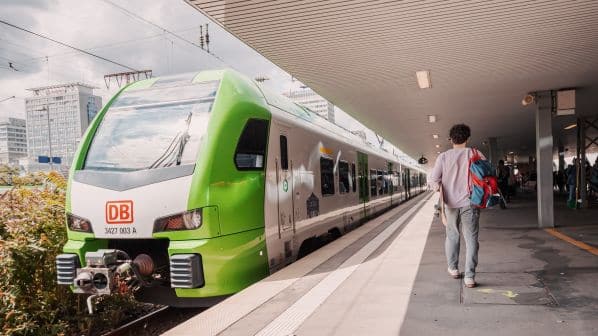A framework agreement for the project to upgrade the single-track line from Münster to Lünen near Dortmund in the German state of North Rhine-Westphalia has been signed by the federal and state governments, German Rail (DB), and regional representatives.
The upgrade of this section of the route between northern Germany, Bremen and North Rhine-Westphalia forms part of the Deutschlandtakt programme to introduce a regular-interval timetable across the country.
Infrastructure upgrades are being undertaken to enable long-distance services to operate every 30 minutes between the largest cities in Germany, while at same time providing paths throughout the day for freight trains.
Work to develop the Münster - Lünen upgrade programme can now begin. Work will include track-doubling on the 24km section between Münster-Amelsbüren and Werne an der Lippe, and raising the maximum speed for passenger services to 200km/h throughout the line.
Stations between Münster-Amelsbüren and Werne an der Lippe will be refurbished, and both active and passive measures will be undertaken to reduce the noise impact of railway operation on local residents.
The upgrade will meet Deutschlandtakt objectives including better train punctuality and service reliability. In addition, it will provide sufficient capacity for more regional services, including those to be introduced under the Münsterland S-Bahn project.
The Deutschlandtakt programme also aims to offer passengers better connections at key nodes and remove bottlenecks across the network.
The Federal Ministry for Digital Affairs and Transport (BMDV) says that the upgrade will mainly be financed through the rail requirement plan and under the Municipal Transport Financing Act.
“Deutschlandtakt as an overall transport concept for rail needs strong partners and planning from a single source,” says BMDV secretary of state, Ms Susanne Henckel.
“The framework agreement that has now been concluded for the upgrade of the Münster - Lünen route expresses exactly that.
“For the regions along the corridor from North Rhine-Westphalia to northern Germany, this means more local trains, better connections, shorter journey times and a more reliable timetable.”
“We are pleased that by signing the framework agreement we have taken the first important step in upgrading the infrastructure between Münster and Lünen,” says Mr Werner Lübberink, DB representative for North Rhine-Westphalia.
“We are ensuring that the rail network in the region will be significantly more efficient and robust,” he says. “In this way, we want to convince even more people that rail is the most environmentally friendly means of transport and play our part in the transport revolution.”
For detailed data on rail infrastructure projects around the world, subscribe to IRJ Pro.

